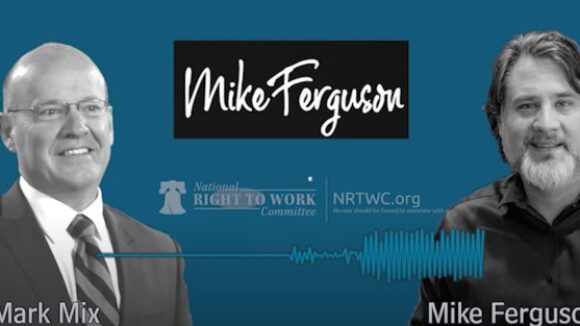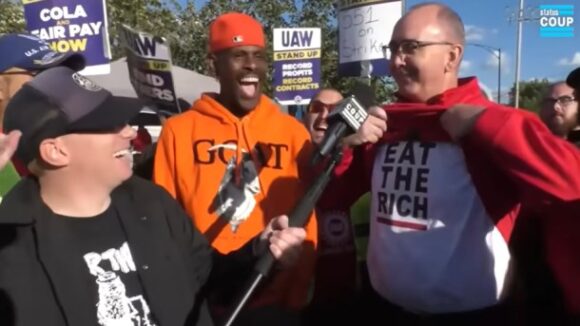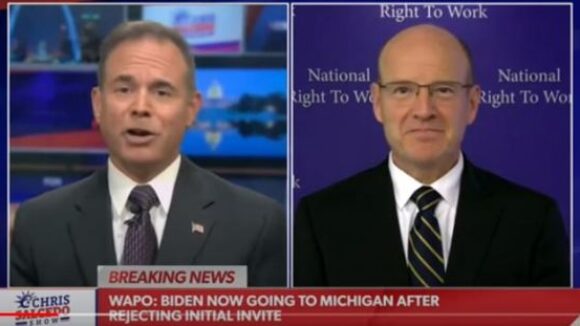Mark Mix discusses the Fallout from the UAW Strike and Big Labor $$$ on St. Louis’s Newstalk
Mark Mix Discusses the Fallout from the UAW Strike on St. Louis’s Newstalk with Mike Ferguson.

A news story appearing in the Los Angeles Times this past weekend (follow the link below to read the whole thing) documents how California bosses of the 265,000-member UNITE HERE union have deployed their forced dues-funded political and lobbying war chest and the monopoly-bargaining privileges they wield under federal law to ensure that unionized bellhops, housekeepers, and other hotel workers in a dozen Golden State cities earn significantly lower pay than their union-free counterparts who are employed in the same industry and in the same market.
In recent years, the hierarchy of UNITE HERE, an AFL-CIO affiliate, “has been a driving force” behind the minimum-wage laws adopted in L.A. and a number of other California cities, according to Times reporter Peter Jamison:
Most large cities in California have raised their minimum wage over the last several years, culminating in Gov. Jerry Brown’s signing the nation’s first statewide $15 minimum wage last week. On the same day, New York enacted a less-comprehensive wage increase that activists also greeted as a victory.
Less celebrated, and often unnoticed, has been a series of loopholes that cut union workers out of the very pay increases their [top officers] have championed.
Among the “left out” unionized workers profiled by Jamison is Bill Martinez, a 53-year-old Sheraton Universal bellhop in L.A. and a UNITE HERE member. Martinez was originally excited two years ago when the L.A. City Council voted to “raise the minimum hourly wage at large hotels to $15.37, which he expected to boost his paycheck by 71%.”
But he “soon found he wouldn’t be getting a raise at all”
Under an obscure provision of the city’s wage hike, unionized hotels were granted an exemption allowing them to pay their employees less. The result is that Martinez, who pays $56.50 every month for membership in the hotel workers union Unite Here, now makes less than those doing the same job in non-union workplaces.
Martinez told Jamison he was “really mad” about the back-room arrangement UNITE HERE and other union bosses had cut with their favored politicians to adopt a “union waiver” from the 2014 minimum-wage law. “I just wanted to be treated equal.” he said. “Don’t exempt us, because we’re the ones paying union dues.”
Infuriated employees like Penny Moore, a “bartender and former union shop steward at the Sheraton Universal,” charge that union bosses’ cynical motive was to make unions, in Jamison’s words, “the ‘low-cost’ option for businesses seeking to avoid paying” higher wages. The ultimate goal is to “drive up union membership — and revenue from dues — at the expense of workers.”
Moore told Jamison that Unite Here Local 11 organizer Fred Pascual had effectively admitted this accusation is true when he spoke with her on the phone shortly after the 2014 ordinance was passed:
“He said I’ve got to look at the bigger picture,” Moore said, that “this is going to make all the hotels go union.” She said Pascual did not elaborate on his remark, but she interpreted it to mean hotels would embrace collective bargaining agreements in order to pay less.
(Pascual admitted to Jamison that he had “discussed the exemption with Moore” but “did not recall specifically what he said,” according to a union spokeswoman.)
Reporters like Jamison are to be commended for helping the public understand how Big Labor deploys its political clout, fueled by dues and fees workers are forced under federal or state law to pay as a condition of employment, and its monopoly-bargaining privileges in combination to sell out the people it supposedly “represents.” It is routine for employees to get paid less as a consequence of being unionized.
Indeed, in a 2015 brief to the U.S. Supreme Court, Big Labor-“friendly” California Attorney General Kamala Harris bluntly acknowledged that monopolistic labor laws give union officials “substantial latitude to advance bargaining positions that . . . run counter to the economic interests of some employees.”
And now forced-unionism cheerleaders in the legal community are openly hoping that Senate confirmation of Obama-nominated Judge Merrick Garland for the U.S. Supreme Court seat left vacant when Justice Antonin Scalia passed away in February will pave the way for the judiciary to declare that the U.S. Constitution actually prohibits lawmakers from protecting independent-minded employees’ freedom to refuse to bankroll an unwanted union that hurts them economically.
Speaking at a conference of union-label academics in Manhattan early last week, New York University Law School professor Cynthia Estlund openly suggested that Garland, if confirmed, and the four justices already on the High Court (Breyer, Ginsburg, Sotomayor and Kagan) who regularly side with the Big Labor hierarchy on controversial legal matters could band together to “reinterpret” the Fifth Amendment’s Takings Clause as prohibiting all state and federal Right to Work legislation.
Estlund simply ignored the fact that federal case law explicitly affirms that union officials may, if they choose, seek and obtain workplace agreements with employers in which the union represents its members only.
Back in 1938, a High Court majority led by Chief Justice Charles Evans Hughs found in Consolidated Edison v. NLRB that, absent the existence of a monopoly-bargaining deal in the workplace, contracts designating a particular union as the bargaining agent only “for those employees who are its members” fall into the framework of protected activity under Section 7 of the National Labor Relations Act (NLRA) and are certainly permissible. Subsequent High Court rulings have confirmed that Hughes’ Consolidated Edison decision applies as well to the NLRA as amended by Taft-Hartley.
Estlund also ignored the fact that under union monopoly bargaining workers who don’t want a union are “often actually made worse off” than they were before, as eminent labor-law scholars Sheldon Leader and the late Clyde Summers have both affirmed.
Jamison’s article this week is just one of many media reports over the years confirming that being subject to “exclusive” union representation is often a detriment. The continued ability of pro-forced unionism academics like Estlund to brush this reality aside as they push for more and more legal special privileges of Big Labor is difficult to fathom, but no one should expect them to recognize publicly the existence of workers like Bill Martinez or Penny Moore any time soon.
Outrage after big labor crafts law paying their members less than non-union workers

Mark Mix Discusses the Fallout from the UAW Strike on St. Louis’s Newstalk with Mike Ferguson.

Union boss Shawn Fain claims to oppose “corporate welfare,” but isn’t hesitant to personally benefit from it. (Credit: Status Coup News…

National Right To Work President Mark Mix appeared on Newmax’s Chris Salcedo Show to discuss the ongoing UAW Strike and It’s Potential Impact on the Economy.